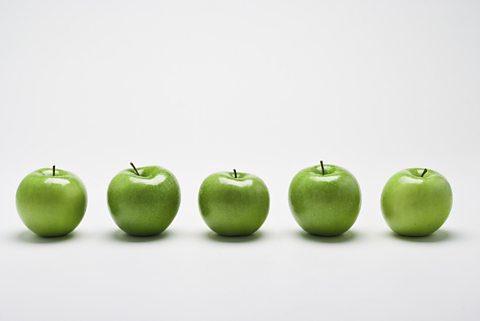Do you know how to count people and things in Irish? Learn some helpful words and phrases and test yourself on others you may already know!
Daoine
People
To count people in English, you just add the number in front of the people being counted. For example, four people, five doctors, six teachers etc.
But in Irish, different words are used to count people.
| Irish | English |
|---|---|
| duine amháin | one person |
| beirt | two people |
| triúr | three people |
| ceathrar | four people |
| cúigear | five people |
| seisear | six people |
| seachtar | seven people |
| ochtar | eight people |
| naonúr | nine people |
| deichniúr | ten people |
| aon duine dhéag | eleven people |
| dáréag | twelve people |
When counting things in Irish, like a box or a chair, there are also some rules to remember.
When counting things from 2 to 6, add a seimhiú or aspirate (add a 'h') in the word if it begins with a consonant. Do nothing to the spelling of a word if it begins with a vowel.
a box is bosca, so three boxes becomes trí bhosca
a chair is cathaoir, so five chairs becomes cúig chathaoir
a glass is gloine, so six glasses becomes sé ghloine
an apple is úll, so two apples becomes dhá úll
When counting things from 7 to 10, add an urú or an eclipsis to the front of the word if it begins with a consonant. Add the prefix n- to the front of the word if it begins with a vowel.
a box is bosca, so seven boxes becomes seacht mbosca
a chair is cathaoir, so nine chairs becomes naoi gcathaoir
a glass is gloine, so eight glasses becomes ocht ngloine
an apple is úll, so ten apples becomes deich n-úll
When counting things in multiples of ten like ten, twenty, thirty and so on, nothing changes in the spelling of the word.
forty boxes remains daichead bosca
fifty chairs remains caoga cathaoir
seventy glasses remains seachtó gloine
twenty apples remains fiche úll
Some of the numbers change spelling when counting things too - dó becomes dhá and ceathair becomes ceithre.
Learn more about adding a séimhiú or urú to certain nouns in this guide.

Eisceachtaí
Exceptions
There are some words that do not follow the general rules for counting things in Irish.
These include…
- ceann (counter for things generally, literally 'head')
- bliain (year)
- pingin (penny)
- uair (hour or time)
You can look at the table below to see how their spellings change, and how they do not follow the regular rules of counting nouns.
| Number | Ceann | bliain | pingin | uair |
|---|---|---|---|---|
| one | aon cheann (amháin) | aon bhliain (amháin) | pingin amháin | aon uair (amháin) |
| two | dhá cheann | dhá bhliain | dhá phingin | dhá uair |
| three | trí cinn | trí bliana | trí pingine | trí huaire |
| four | ceithre cinn | ceithre bliana | ceithre pingine | ceithre huaire |
| five | cúig cinn | cúig bliana | cúig pingine | cúig huaire |
| six | sé cinn | sé bliana | sé pingine | sé huaire |
| seven | seacht gcinn | seacht mbliana | seacht bpingine | seacht n-uaire |
| eight | ocht gcinn | ocht mbliana | ocht bpingine | ocht n-uaire |
| nine | naoi gcinn | naoi mbliana | naoi bpingine | naoi n-uaire |
| ten | deich gcinn | deich mbliana | deich bpingine | deich n-uaire |

Na horduimhreacha
Ordinal numbers
Ordinal numbers tell us the position of something. For example, first, second or third.
These are also used in Irish to indicate dates. For example, an seachtú lá mí Feabhra - the seventh of February.
| Irish | English |
|---|---|
| an chéad | first |
| an dara | second |
| an triú | third |
| an ceathrú | fourth |
| an cúigiú | fifth |
| an séú | sixth |
| an seachtú | seventh |
| an t-ochtú | eighth |
| an naoú | ninth |
| an deichiú | tenth |
| an t-aonú lá déag | the eleventh day |
| an fichiú | twentieth |
| an t-aonú lá is fiche | the twenty-first day |
More on The world around me
Find out more by working through a topic
- count5 of 8

- count6 of 8

- count7 of 8

- count8 of 8
